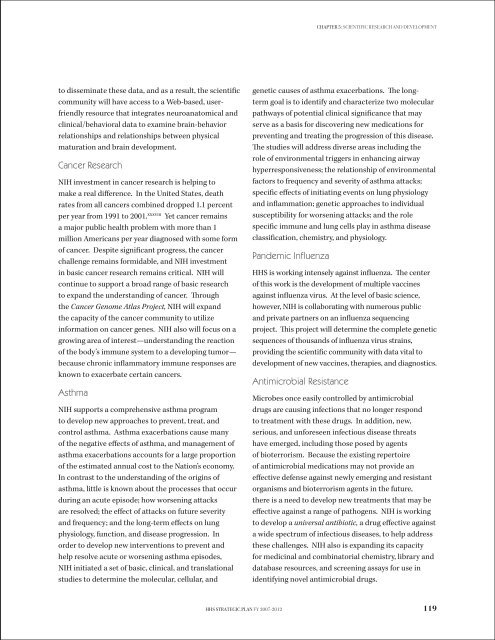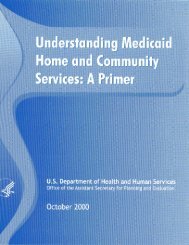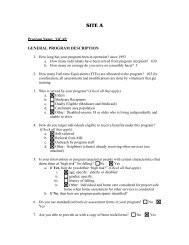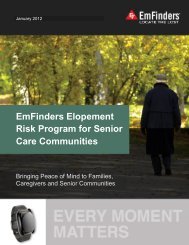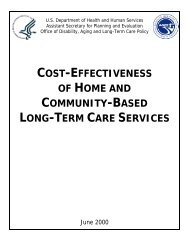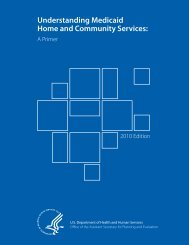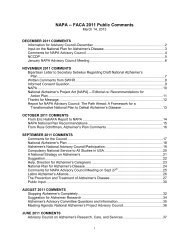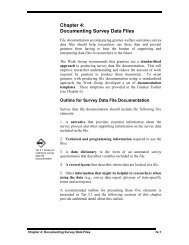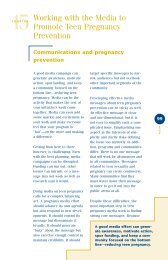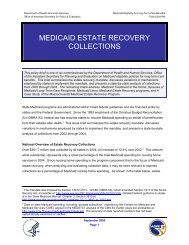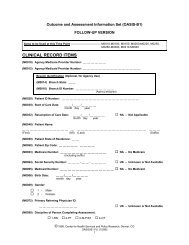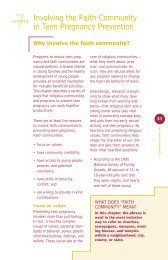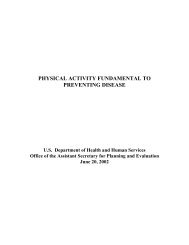STRATEGIC PLAN - ASPE - U.S. Department of Health and Human ...
STRATEGIC PLAN - ASPE - U.S. Department of Health and Human ...
STRATEGIC PLAN - ASPE - U.S. Department of Health and Human ...
You also want an ePaper? Increase the reach of your titles
YUMPU automatically turns print PDFs into web optimized ePapers that Google loves.
CHAPTER 5: Scientific Research <strong>and</strong> Developmentto disseminate these data, <strong>and</strong> as a result, the scientificcommunity will have access to a Web-based, userfriendlyresource that integrates neuroanatomical <strong>and</strong>clinical/behavioral data to examine brain-behaviorrelationships <strong>and</strong> relationships between physicalmaturation <strong>and</strong> brain development.Cancer ResearchNIH investment in cancer research is helping tomake a real difference. In the United States, deathrates from all cancers combined dropped 1.1 percentper year from 1991 to 2001. xxxviii Yet cancer remainsa major public health problem with more than 1million Americans per year diagnosed with some form<strong>of</strong> cancer. Despite significant progress, the cancerchallenge remains formidable, <strong>and</strong> NIH investmentin basic cancer research remains critical. NIH willcontinue to support a broad range <strong>of</strong> basic researchto exp<strong>and</strong> the underst<strong>and</strong>ing <strong>of</strong> cancer. Throughthe Cancer Genome Atlas Project, NIH will exp<strong>and</strong>the capacity <strong>of</strong> the cancer community to utilizeinformation on cancer genes. NIH also will focus on agrowing area <strong>of</strong> interest—underst<strong>and</strong>ing the reaction<strong>of</strong> the body’s immune system to a developing tumor—because chronic inflammatory immune responses areknown to exacerbate certain cancers.AsthmaNIH supports a comprehensive asthma programto develop new approaches to prevent, treat, <strong>and</strong>control asthma. Asthma exacerbations cause many<strong>of</strong> the negative effects <strong>of</strong> asthma, <strong>and</strong> management <strong>of</strong>asthma exacerbations accounts for a large proportion<strong>of</strong> the estimated annual cost to the Nation’s economy.In contrast to the underst<strong>and</strong>ing <strong>of</strong> the origins <strong>of</strong>asthma, little is known about the processes that occurduring an acute episode; how worsening attacksare resolved; the effect <strong>of</strong> attacks on future severity<strong>and</strong> frequency; <strong>and</strong> the long-term effects on lungphysiology, function, <strong>and</strong> disease progression. Inorder to develop new interventions to prevent <strong>and</strong>help resolve acute or worsening asthma episodes,NIH initiated a set <strong>of</strong> basic, clinical, <strong>and</strong> translationalstudies to determine the molecular, cellular, <strong>and</strong>genetic causes <strong>of</strong> asthma exacerbations. The longtermgoal is to identify <strong>and</strong> characterize two molecularpathways <strong>of</strong> potential clinical significance that mayserve as a basis for discovering new medications forpreventing <strong>and</strong> treating the progression <strong>of</strong> this disease.The studies will address diverse areas including therole <strong>of</strong> environmental triggers in enhancing airwayhyperresponsiveness; the relationship <strong>of</strong> environmentalfactors to frequency <strong>and</strong> severity <strong>of</strong> asthma attacks;specific effects <strong>of</strong> initiating events on lung physiology<strong>and</strong> inflammation; genetic approaches to individualsusceptibility for worsening attacks; <strong>and</strong> the rolespecific immune <strong>and</strong> lung cells play in asthma diseaseclassification, chemistry, <strong>and</strong> physiology.P<strong>and</strong>emic InfluenzaHHS is working intensely against influenza. The center<strong>of</strong> this work is the development <strong>of</strong> multiple vaccinesagainst influenza virus. At the level <strong>of</strong> basic science,however, NIH is collaborating with numerous public<strong>and</strong> private partners on an influenza sequencingproject. This project will determine the complete geneticsequences <strong>of</strong> thous<strong>and</strong>s <strong>of</strong> influenza virus strains,providing the scientific community with data vital todevelopment <strong>of</strong> new vaccines, therapies, <strong>and</strong> diagnostics.Antimicrobial ResistanceMicrobes once easily controlled by antimicrobialdrugs are causing infections that no longer respondto treatment with these drugs. In addition, new,serious, <strong>and</strong> unforeseen infectious disease threatshave emerged, including those posed by agents<strong>of</strong> bioterrorism. Because the existing repertoire<strong>of</strong> antimicrobial medications may not provide aneffective defense against newly emerging <strong>and</strong> resistantorganisms <strong>and</strong> bioterrorism agents in the future,there is a need to develop new treatments that may beeffective against a range <strong>of</strong> pathogens. NIH is workingto develop a universal antibiotic, a drug effective againsta wide spectrum <strong>of</strong> infectious diseases, to help addressthese challenges. NIH also is exp<strong>and</strong>ing its capacityfor medicinal <strong>and</strong> combinatorial chemistry, library <strong>and</strong>database resources, <strong>and</strong> screening assays for use inidentifying novel antimicrobial drugs.HHS Strategic Plan FY 2007-2012119


